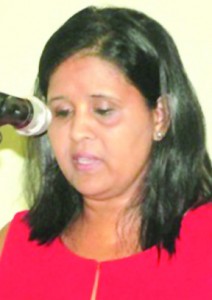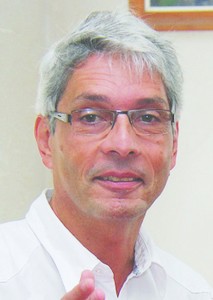
Coordinator Dr Shanti Singh

Dr Roberto Campos
The National AIDS Programme Secretariat (NAPS) on Tuesday commenced a two-day national conference for Persons Living with HIV (PLHIVs), with speakers urging infected persons to take ownership of their own lives. The conference, which targeted approximately 50 peer support group leaders from Regions Two, Three, Four, Five, Six, and 10, was held at the Regency Suites, Georgetown.
The aim is to deliberate on the quality of social support services provided through the national HIV care and treatment programme, to identify the gaps, and to make recommendations on how to improve the programme.
A release from NAPS said an important focus was how PLHIVs could take ownership for their own lives and become actively involved in ensuring sustainability of the HIV care, treatment, and support programmes. In this regard, the theme of the conference is “Motivation Towards Positive Living, Supporting Sustainability”.
Positive living
NAPS programme coordinator, Dr Shanti Singh, in her presentation, highlighted that the conference focuses on positive living and sustainability of the social support services need by PLHIVs. Importantly, much attention is on the involvement of PLHIVs, since this is an essential part of the recently-launched HIVision 2020 initiative.
Dr Singh recounted that NAPS has achieved several milestones, and Guyana is now one of 14 countries to have achieved universal access to care and treatment, adding that this was achieved through the multi-sectoral collaboration and commitment of all stakeholders.
G-Plus Programme Manager Chrystol Albert-Hope, in her remarks, acknowledged the tremendous strides made by the National HIV programme over the years.
Special achievements were the commencement of free anti-retroviral treatment in 2002, the near elimination of mother-to-child transmission of HIV, and the reduction of stigma and discrimination associated with HIV.
Pan Caribbean Partnership against HIV & AIDS (PANCAP) recently-appointed head, Dereck Springer, acknowledged that Guyana has much to celebrate, because 20 years ago HIV was seen as a death sentence. He noted that Guyana has gone beyond other Caribbean countries in providing community, home and palliative treatment.
Responsibility
Springer urged the participants to look at shared responsibility and self-management, as the focus is now on country ownership in light of decreasing donor funding for HIV. UNAIDS Country Director, Dr Roberto Campos, highlighted the organisation’s strategy of zero new infections, zero new HIV-related deaths, and zero stigma and discrimination.
He noted that the epidemic had changed from one of despair to hope – HIV is no longer a death sentence.
He also highlighted the central role that PLHIVs can play in controlling the epidemic by adhering to their treatment regimen as this reduces the chance of transmission to only four per cent.



